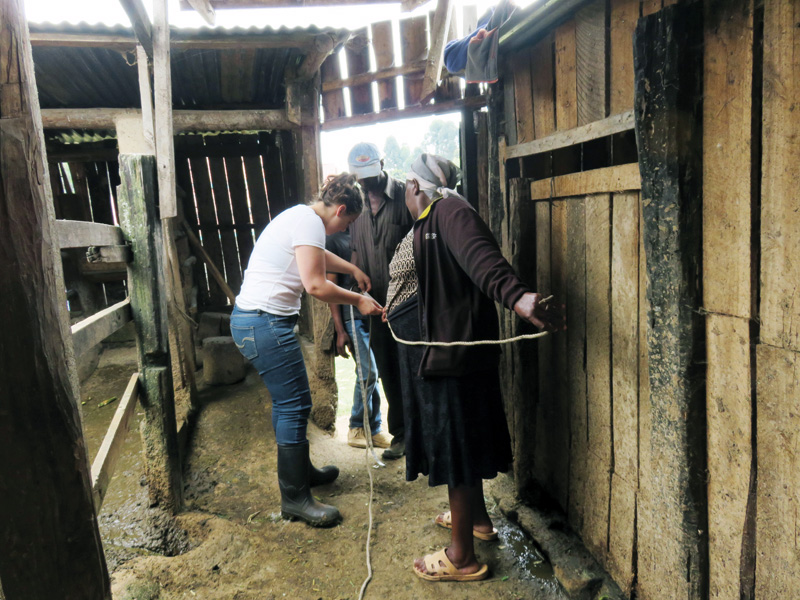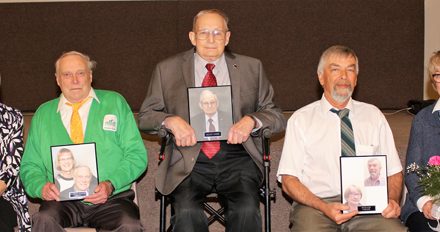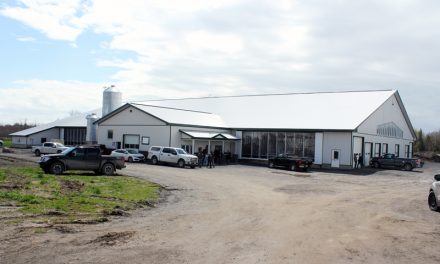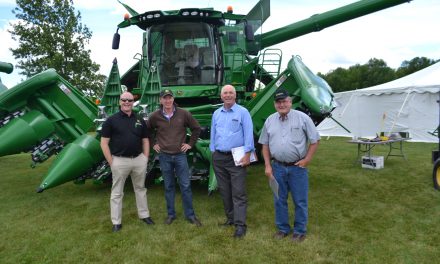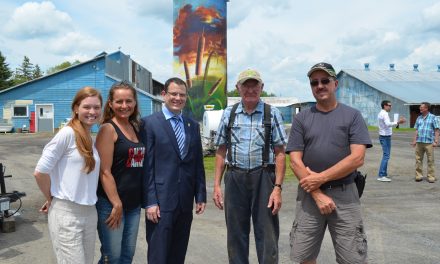Worth the weight
Maggie Henry demonstrates how to use a piece of rope as a weight tape for estimating the weight of the cows. Since weight was typically underestimated by the farmers for de-worming, the VWB team wanted to show them how to get a better idea of the weight of their cows in order to effectively de-worm them. Courtesy Henry photo

Welcoming new practices Dr. Kelli Pinner and Maggie Henry are seen de-worming cows during a visit to a farm in Meru, Kenya. De-wormer was something that all the farmers asked about, and it was administered at each farm visited. Courtesy Henry photo
by Dianne Pinder-Moss
AgriNews Contributor
LANARK COUNTY – Growing up on a dairy farm outside of Carleton Place, Maggie Henry is passionate about agriculture, and cows in particular.
“I might be slightly biased – I love working with cows,” she stated in a recent telephone interview. “I think cows are great. I like making tiny tweaks to their environment.”
Early this summer, Henry got to share this passion with farmers halfway around the world as she spent three weeks in Kenya through the organization Veterinarians Without Borders (VWB).
Founded in 2005 to facilitate volunteer work by Canadian veterinarians in developing countries throughout the world, VWB’s volunteers have expanded over the years to also include food safety specialists, animal and human nutritionists, community health specialists, community developers, etc.
In her case, Henry completed her undergraduate degree in animal biology at the University of Guelph and is currently pursuing her PhD in epidemiology there. For her doctorate project, she is working with pigs.
“My PhD is looking at if there are any therapeutic effects of the amino acid tryptophan on growing pigs,” she explained. “We are hoping to see positive influences on aggression (such as tail biting) and positive growth impacts as well.”
Henry’s involvement with VWB came through a job posting a friend had sent her thinking the position was “up my alley.”
“I applied on a whim never thinking I was going to get it,” she related. “I did get it.”
The 32-year-old’s successful application was for the position of farm management advisor in Meru, Kenya.
Kenya is among more than a dozen countries in which VWB has set up projects, which receive support from individual donors, foundations, governments and corporations. In Kenya, for example, Meru Dairy Co-operative Union Ltd. is a local partner of the Healthy Animals and Healthy Communities program in which Henry did her volunteer placement.
Initiated in 2015, the aim of this particular program, according to the PhD student, is to help educate and provide skilled volunteers to assist local producers in the area “so they can help them improve the nutrition of their animals and thus also improve their livelihoods.”
Henry was in Kenya from May 23 to June 21. Two of the weeks overlapped with the placement of Dr. Kelli Pinner, a veterinarian from Lethbridge, AB who was volunteering through VWB as a dairy veterinarian.
Through her work, she and Dr. Pinner travelled to different areas in the Meru region to meet with farmers and, in some cases, visit individual farms.
In comparison to the herd size of Canadian dairy farms, their Kenyan counterparts are “pretty tiny,” according to Henry.
“The biggest one we saw was around 25 cows,” she related. “Everyone else (we worked with) had two to four cattle.” It is common practice in Kenya to have one cow.
Like Canada, Henry said Holsteins are a popular breed on dairy farms in the Meru region. However, she mentioned that the herds can also include a Friesian mix, Jersey, Guernsey and Dairy Shorthorn cattle.
As part of her work with VWB, during the team’s meetings with farmers, she would make suggestions on nutrition and cow comfort “to help them produce more milk in a day, which would lead to more money for the farm.”
Having perceived Kenya as a country that was “kind of brown and barren,” that misconception was quickly dispelled for Henry.
“It was beautiful,” she asserted. “It was green and lush and gorgeous.”
Aside from the geographic beauty of the country, Henry was also captivated by the beautiful temperament of the people she met.
“Everyone was so incredibly friendly,” she remarked. “So interested in what my life was like here (in Canada) – so welcoming.”
As well, they were “so eager to learn,” she added.
It was exciting for Henry to see the farmers with which she and Dr. Pinner worked, learn new skills, as well as see the progress the Kenyans had made from implementing changes suggested by the previous year’s VWB team.
“These small changes could make huge impacts, in terms of the cows’ comfort and wellbeing, as well as the farmers’ economic status,” she noted.
Another highlight of working with the farmers in Meru was being able to dispel some myths they held about their farming practices. One long held belief was that a cow eating her afterbirth would lower her milk production.
“We advised the community about possible choking hazards, but let them know that if their cow(s) did ingest the afterbirth, there would not be any detrimental effects on milk production,” she shared.
Outside of her volunteer work, Henry had the opportunity to visit four different safari parks while she was in Kenya. She had day-long excursions to the Ol Pejeta Conservatory, Lake Nakuru National Park and Samburu National Park. She also spent a weekend on safari at Meru National Park, staying at the Rhino River Camp in the rhino sanctuary. Being able to get up close to animals she had only seen in a picture book or at the zoo, like African elephants, water buffalo and lions was an “unbelievable” experience for her.
Of course, the trip was not without its challenges, particularly in regards to infrastructure. A 20-kilometre drive there could take more than an hour, she explained, because the roads were “not well kept.”
As someone who has always prided herself on her punctuality, the poor road conditions in Kenya and a philosophy “that things happen when they happen” required Henry to become more flexible in this regard.
“I learned that patience is a virtue,” she quipped, laughing.
Depending on how her research is proceeding, Henry hopes to reapply with VWB to return to Kenya again next year at the same time.
“It was really wonderful seeing the changes farmers had implemented from the first group,” she said. “I’d like to see if they’ve taken any of our advice or gone in a different direction and see the benefits of that as well.”
Henry will be speaking on her Kenya experience with VWB at the Nov. 8 meeting of the Lanark Federation of Agriculture (LFA). All members of the LFA are being invited to attend the meeting, which will take place at the Beckwith Township Council Chambers at Blacks Corners at 7:30 p.m.

